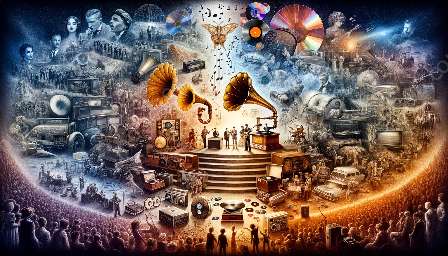Radio DJs and presenters play a crucial role in shaping the success of music tracks and artists, with their influence extending far beyond the airwaves. Understanding the role of radio in the music industry and its impact on the music business is essential for artists, labels, and music enthusiasts alike.
The Role of Radio in Music Industry
Radio has been a cornerstone of the music industry for decades, serving as a vital platform for discovering, promoting, and experiencing music. It has the power to break new artists, drive sales, and create cultural phenomena through the exposure it provides. Radio also serves as a direct link between artists and their audience, allowing for real-time feedback and engagement.
Music Business and Radio
The relationship between the music industry and radio is symbiotic, with each influencing the other's success. Radio provides a platform for promoting new releases, generating excitement for upcoming tours and events, and even influencing the music charts. In return, the music industry provides radio with exclusive content, artist access, and promotional opportunities.
Influence of Radio DJs and Presenters
Radio DJs and presenters hold significant sway over the success of music tracks and artists. Their choice of what to play, how to present it, and when to play it can greatly impact an artist's visibility, fan base, and commercial success. DJs also have the ability to introduce listeners to new music, creating trends and shaping popular culture. Their influence extends to live events, where they can act as tastemakers and trendsetters.
Breaking New Artists
Radio DJs and presenters are often the first point of contact for many new artists seeking exposure. By championing emerging talent and giving them airtime, DJs have the power to ignite the careers of unknown musicians and create a buzz around their music. The support of radio can lead to record deals, chart success, and ultimately, a loyal fan base.
Creating Hit Records
Radio play is a driving force behind hit records. DJs and presenters have the ability to turn a relatively unknown track into a chart-topping hit through repeated airplay and audience engagement. Their endorsement can affect streaming numbers, digital downloads, and physical sales, propelling a song and its artist into the mainstream spotlight.
Connecting with Fans
Radio provides a direct connection between artists and their fans. DJs and presenters act as conduits, sharing exclusive interviews, behind-the-scenes insights, and live performances, fostering a sense of intimacy and loyalty among listeners. This engagement often translates into ticket sales, merchandise purchases, and overall artist support.
Global Reach and Cultural Influence
Radio has the power to transcend borders and languages, bringing music to a global audience. DJs and presenters who champion diverse and international sounds can shape musical tastes and trends on a global scale, influencing the cultural landscape and promoting cross-cultural dialogue.
Adapting to Digital Platforms
The digital age has transformed the way radio operates, with online streams, podcasts, and social media becoming integral parts of the radio experience. Radio DJs and presenters now have the opportunity to engage with audiences in new ways, fostering communities, and discovering music from around the world.
Conclusion
Radio DJs and presenters have a profound impact on the success of music tracks and artists, shaping cultural trends, driving sales, and connecting artists with their audience. Recognizing the vital role that radio plays in the music industry and understanding the symbiotic relationship between radio and the music business is essential for navigating the ever-evolving landscape of the music industry.









































